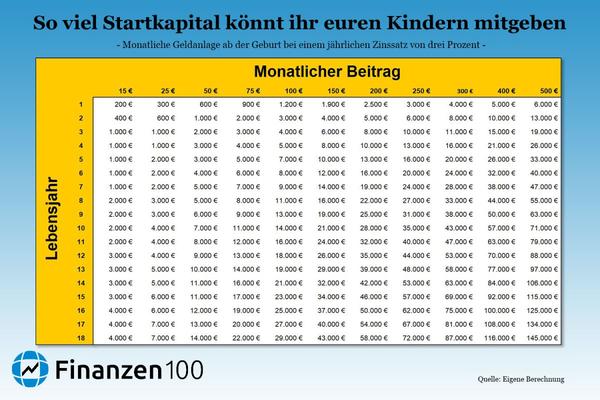When I was little, going to the Sparkasse counter on World Savings Day was always a highlight for me. You could bring the piggy bank and pay into the savings account, spin the wheel of fortune, get some giveaway and proudly march out again with a Knax booklet under your arm.
When we were teenagers, my parents trusted my sister and I with our savings accounts, thinking we would handle them responsibly. What they hadn't considered was that the first H&M opened in our town that same year. From then on, part of the money we had previously saved ended up with Messrs. Hennes and Mauritz.
So before I tell you how I can best invest money for your children, the advice is: don't give them the money so early. Preferably at 18 - even better at 38. It doesn't matter how trustworthy they can look at you.
Burn money with the savings account
What should probably be clear to everyone: You won't get far with the savings book. Quite the contrary: You are wasting money in the process. Suppose you find another savings account that gives you 0.1 percent interest. If you plan to save an average of 25 euros every month from the birth of your child until the age of 18, you have paid in a total of 5,400 euros. You will receive a whopping 4.84 euros in interest. In Munich, that's not even enough for a ticket to the nearest lake.
Some might think at this point: It's better than nothing! Unfortunately, one forgets the annual inflation. In May alone there was inflation of 2.5 percent compared to the previous year. This means that while a year ago you paid 100 euros for your weekly shopping, this year it is 102.50 euros.
However, if we calculate with a somewhat moderate, average annual inflation of 2 percent and deduct this from your investment amount, the real value when your descendant comes of age is 3,784.28 euros. So while you think you are investing, you are actually burning money - and quite a bit!
So if you make the effort to regularly set aside part of your income for your child, then it should be worth it. And the best way to do that is with stocks or ETFs.
Share accounts for children
Many banks offer free children's custody accounts that can be used to invest on behalf of the little ones. And can be extremely worthwhile. If you are stock-savvy and would like to put together your own portfolio with promising companies, you can do so. If you don't feel like analyzing and evaluating stocks, you can simply rely on the popular ETFS.

Instead of investing in individual stocks, you invest in entire indices - for example the DAX. With an investment of 25 euros, I regularly buy a small share of each of the 30 companies included in the DAX. From autumn it will be the 40 largest companies, since the DAX will be expanded to include 10 companies from the next largest index, the M-DAX.
If you don't want to bet on the domestic market - which is advisable anyway in view of broader diversification - you can invest in the popular world portfolio MSCI World. Here I invest my 25 euros in over 1,600 companies from 23 industrialized countries.
The world's largest ETF on this index alone has generated an annual return of 12.77 percent since it was launched. (Note: No investment recommendation!) So if you use an ETF instead of a savings account, the 5,400 euros can turn into an incredible 19,338.77 euros in 18 years. Again, to be fair, we have to subtract inflation. With an annual inflation of 2 percent, there is still 13,540.22 euros.
Enough money for Junior to finance his move to the nearest university town himself and to visit you every weekend for at least four years. Or take a one-year trip around the world. Depending on which idea you prefer.
This is how you invest for your child
As already described above, you can open a free depot with many providers. This raises the question of whether you want to do it on your behalf or on behalf of the child. Both have advantages and disadvantages. For tax reasons, it is better if your child has their own custody account. Because then it can also benefit from the savings allowance and the tax allowance. Newborns in Germany are not only greeted by relatives with cards, but also by the tax office with their own tax ID.
But of course the amount belongs to your child 100 percent when they are 18 - and they can do what they want with it. I just say H&M...
Once the depot is opened, you have to decide how and with what you want to invest. The important thing here is that you need to understand what you are doing, not only with your own share portfolio, but also with that of your child. So don't just take the riskiest stocks or ETFs just because they've had good returns lately, but really find out what the ETF contains.
For example, you can also rely on sustainable ETFs that do not contain any companies from dubious sectors - or those that do not take child labor and human rights very seriously.
And what about student loans?
When doing these calculations, I often hear the concern that the child may no longer be able to obtain student loans if they have too much wealth. However, the goal can hardly be that your child will later be dependent on Bafög. If necessary, you can invest the amount in meaningful and necessary materials for your studies. According to my investigative research, nobody has ever regretted having saved too much money.
One last tip: The account number from the clearing account that comes with the share deposit account can also be printed on baby cards. This might save you the tenth baby romper with an original "Freshly pressed" imprint.
Margarethe Honisch is a financial blogger and author. On her website Fortunalista and her Instagram account of the same name, she gives tips on retirement planning and investments. She writes the column “Make more with money” for Business Insider.



